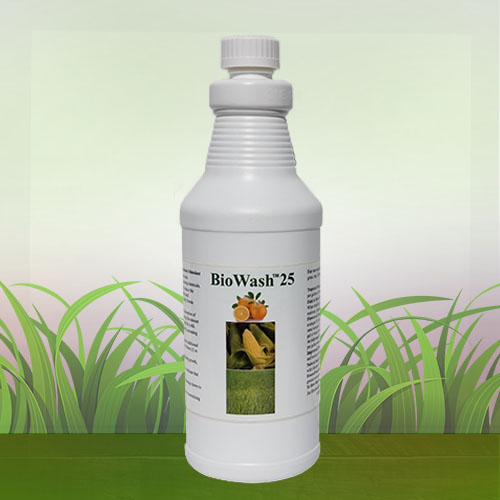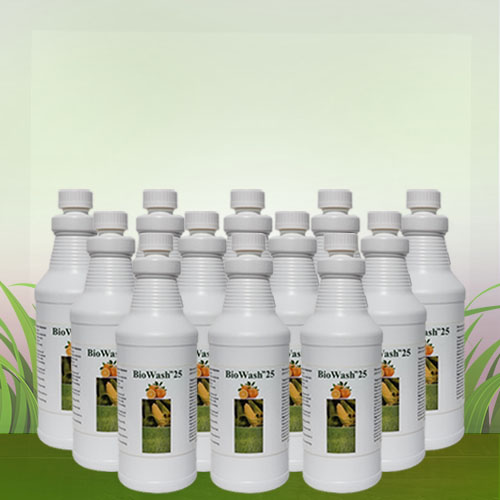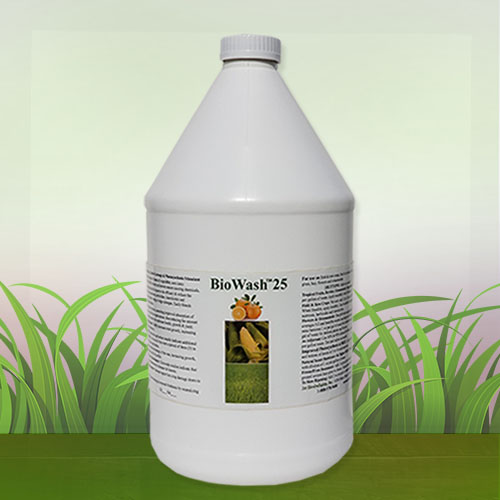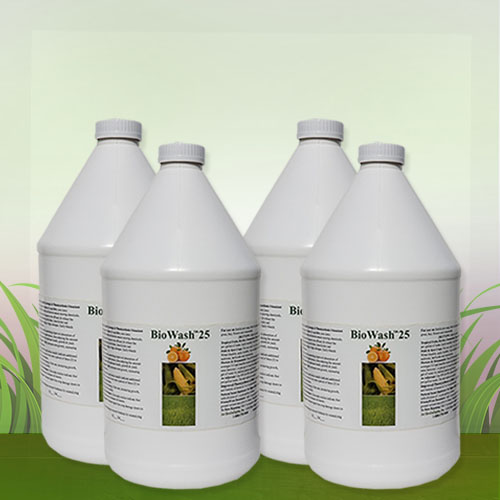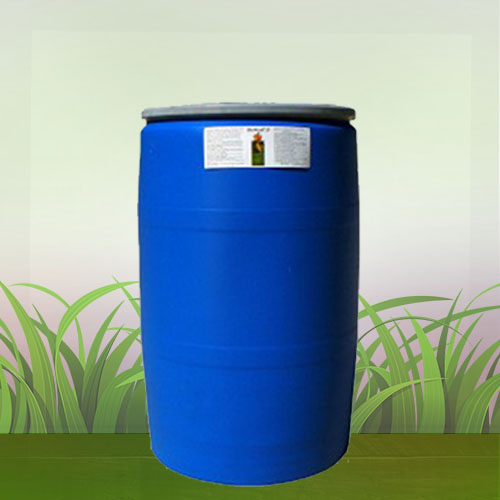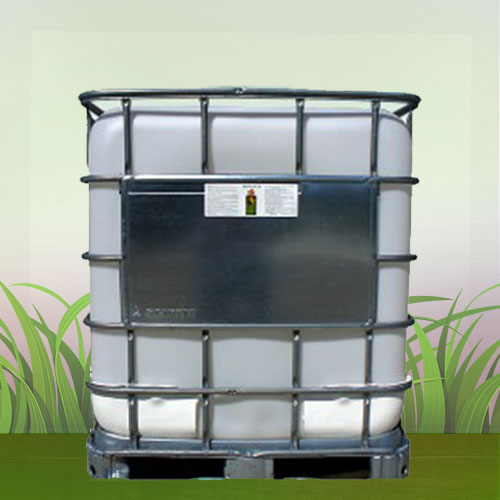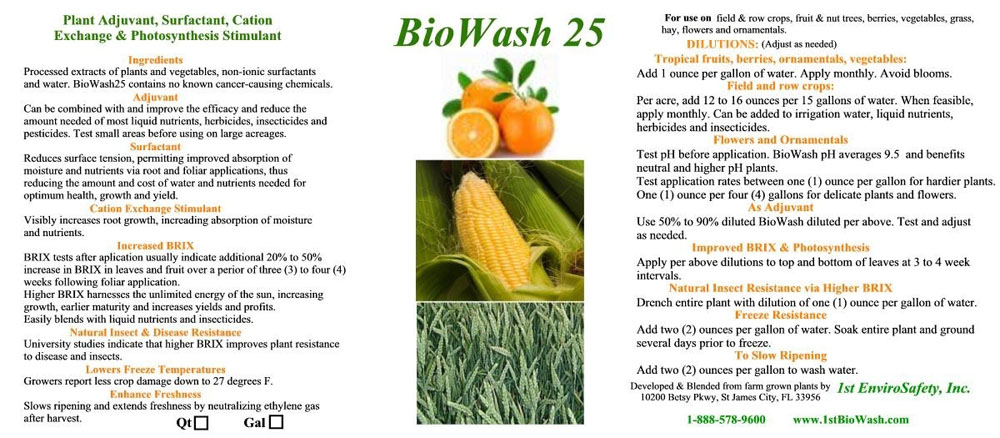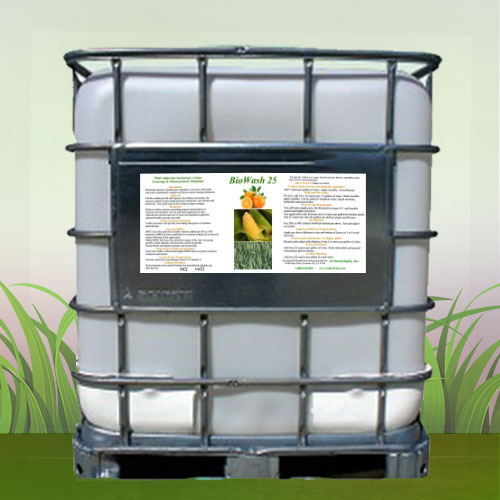Description
BioWash 25
BioWash is a nano powered bio-stimulant that enhances plant absorption of nutrients; plant growth, yields and grower profits.
Enhances root development and photosynthesis, resulting in stronger plants and dramatically increased yields plus extended season harvesting. End result: Pleasing farm profits.
(NOTE to large farm farmers: Telephone 239-283-1222 for details re bulk concentrates savings.)
BioWash Benefits:
This single inexpensive product provides 17 profitable benefits for gardeners and farmers.
1) Faster, healthier germination;*2) Transplant shock prevention; 3) Enhanced root development; 4) Enhanced nutrient and moisture absorption; 5) Reduced fertilizer costs; 6) Improved nutritional content; 7) Faster growth and maturity; 8) Larger produce; 9) Improved BRIX; 10) Freeze and frost resistance; 11) Drought resistance; 12) Summer heat resistance; 13) Earlier to market (premium prices); 14) Extended producing seasons (income); 15) Extends food freshness and marketability; 16) Delayed spoilage; 17) Enhanced photosynthesis.
BioWash is NOT a fertilizer. Because of the spectacular growth and yield explosions, some growers mistakenly believed it is a fertilizer. BioWash enables plants to absorb available nutrients left from previous seasons but does not replace fertilizers. Once available fertilizers are absorbed, additional nutrients are required.
Since 2005, farmers worldwide have reported dramatic increases in nearly every flower, fruit and nut trees, field and row crops, forage, grass, pasture, shrub, tree, turf, vegetables, etc. BioWash works for ALL plants.
An agronomist said, “If a plant has roots and leaves, BioWash will help.”
VIEW EXAMPLES
Agricultural conditions vary from crop to crop, area to area, weather, etc. but BioWash farmers routinely report yield increases ranging from a low of 20% to 75%. Rare and exceptional reports range to 1,500% (mangos).
Additional benefits include earlier marketing (premium prices), larger sizes, higher BRIX, freeze/frost survival, post-harvest freshness extension, delay or spoilage.
How To Apply
BioWash 25 is inexpensive and easy to apply. Dilutions are on the labels. Simply spray generously on leaves, stems, and trunks.
Dilutions: Follow label instructions.
The suggested ounces per acre can vary depending on the size of the plants. For example, small, newly emerged plants (6 to 12 inches high) may be covered with as little as three (3) ounces per acre. Large plants, such as mature tobacco and trees will require six (6) to eight (8)) ounces per acre and more water to thoroughly wet the leaves. Tree sizes vary from small shoots to large trees.
For very delicate plants such as lettuce, orchids, violets, etc., apply at ½ the generally recommended strength.
A single application in the early life of the plant produces larger, healthier, stronger roots that benefit the plant throughout its life. Optimum benefits are achieved with only three (3) applications per season for most crops. The first treatment should be applied within two weeks of emergence followed by two more applications at three-week intervals. Some exceptions apply. Rice and sugar cane benefit from monthly applications throughout the plant life.
20+ years of field reports from real farmers suggest the following general applications for various crops. Feel free to adjust per your local conditions. Repeat. BioWash is very forgiving. If it’s not applied perfectly, it will still produce benefits.
To view examples, click here.
- Bushes, shrubs and ornamental trees – Apply monthly during the growing season.
- Field and row crops such as corn, soybeans, wheat, and similar crops – Apply three times at 15-day intervals.
- Flowers – Apply at 10 to 15-day intervals to extend the blooming season.
- Forage, golf courses, lawns, pastures, turf, etc. Apply monthly for growth and to extend the growing season into winter.
- Rice – Apply four treatments at 14-day intervals until harvest.
- Root crops such as beets, potatoes, radishes, turnips. Apply at 14-day intervals until harvest.
- Trees*, including citrus and tropical fruits such as mango, papaya, etc. – Start before flowering, then monthly until one week before ripening commences. NOTE- Cease application before ripening commences.
- Trees*, including ornamentals, nuts, etc. – Apply monthly during the growing season.
- Trees*, including timber, cordwood, Christmas, etc. – Apply quarterly until harvest.
- Vegetables such as leafy vegetables – Apply weekly until one week before harvest.
- Vines such as cucumbers, melons, peppers, squash, tomatoes, watermelons. Continued spraying at 14-day intervals will extend the productive season.
- Soak tree roots with BioWash Soil Amendment one time in early spring.
ADDITIONAL BENEFITS
In addition to stimulating growth, yield, nutrient content and profits, BioWash consumers enjoy additional benefits:
BRIX (Sugar)
Growers report BRIX increases ranging from 20% to 40%, lasting three to four weeks. Benefits include increased photosynthesis, freeze damage resistance, insect resistance, sweeter taste, higher nutritional value, and more marketable produce. To enjoy these benefits, spray crops at three (3) or four (4) week intervals.
“DEAD” or DYING PLANTS or TREES
“Dead” or dying plants may be saved through ongoing treatment with BioWash. Drench all remaining leaves, the limbs, trunks, and roots, applying it every week until signs of life return. Applications can be reduced to once per month after that.
DISEASE TREATMENT/NUTRITION
Healthy, robust plants with higher BRIX are more resistant to insects and diseases. A Florida botanist adds BioWash to special nutrients to rescue citrus groves from Citrus Greening and other diseases.
DROUGHT
BioWashed crops are more able to withstand drought stress. During a severe Texas drought, while neighboring ranchers lost their crops, a rancher who had BioWashed his oats enjoyed his “best crop ever” with the highest nutritional content. That season, New York corn fields barely produced even scrubby nubbins but one grower BioWashed her corn and produced exceptionally large, sweet ears.
FORAGE, HAY, PASTURES
Dairies report that BioWashed grass continues to grow an additional month into winter and averages an additional 30% greater weight per bale. Apply one quart of BioWash 25 per acre with sufficient water to wet the stalks and roots. Apply to stubble within two weeks after cutting and then repeat at three- or four-week intervals.
FRESHNESS AND MARKETABILITY EXTENSION
To extend freshness and edibility of produce and to dissolve oil encased dirt, insecticides and other contaminants in organic and non-organic produce, wash with BioWash. BioWash neutralizes the natural gas emitted by the plant to initiate ripening and eventual spoilage. To delay spoilage, spray or wash produce in a solution of BioWash. A five-minute exposure is recommended. Rinse well before consumption.
CAUTION: Never BioWash fruit at the beginning of its ripening stage as it can delay or stop the ripening process.
FROST/FREEZE DAMAGE
Continual treatments at regular intervals tend to keep the plants robust enough to reduce the likelihood of frost or freeze· damage down to 26°F. This offers about six degrees of safety. Some reports indicate success as low as 19F.
Application: If the crop has not been BioWashed, begin generous and repeated drenching with BioWash. This may save your income.
A California orange grower BioWashed his 4,450 trees ten days before a surprise 26°F freeze that destroyed 70% of the California citrus crop in his area. A neighboring grove lost every orange. The BioWashed grove suffered no loss.
In an exceptional example, a peach grower near Niagara Falls treated his 35 acres of peaches just prior to a 19°F.freeze. He was the only peach grower in the valley to enjoy a successful harvest. 1st EnviroSafety Inc. cannot guarantee 100% success in saving crops, but numerous growers do report good results with timely, inexpensive applications.
FROST/FREEZE RECOVERY
Frozen trees die slowly. BioWashing within a few days after the freeze may save them. Drench all leaves, limbs, trunk, and roots with BioWash. Repeat daily for one week.
GERMINATION
For small, soft seeds, use no more than one tablespoon of BioWash per 12 gallons of water. Soak the seeds for a maximum of 20 minutes. You may also spray seeds after sowing and before covering them. Soak hard seeds (corn, beans, okra, etc.) several minutes. CAUTION – Overexposure of small soft seeds (turnips, radishes, tomatoes, etc.) may dissolve the seeds, preventing germination.
GOLF COURSES
For damaged greens, drench the grass. Repeat at two-week intervals until lush again, and then treat monthly or in coordination with standard maintenance. If injected via regular or continuous watering, add one (1) ounce per 1,000 gallons. When combining with fertilizers or other nutrients, add one (1) ounce per five gallons of liquid nutrients.
GRAFTING
Spray the cut area generously. Vivian Murray, the former owner of Tree House Nursery, improved grafting success from 40% to 90% after treating her BioWashing her plants.
HYDROPONICS
There are numerous ways to grow via hydroponics. One successful grower adds only one (1) ounce of BioWash 25 per 500 gallons of liquid nutrients. His water circulates continuously.
TRANSPLANTING
BioWash has been found to prevent transplanting shock. Add one ounce of BioWash to 10 gallons of transplant water.


